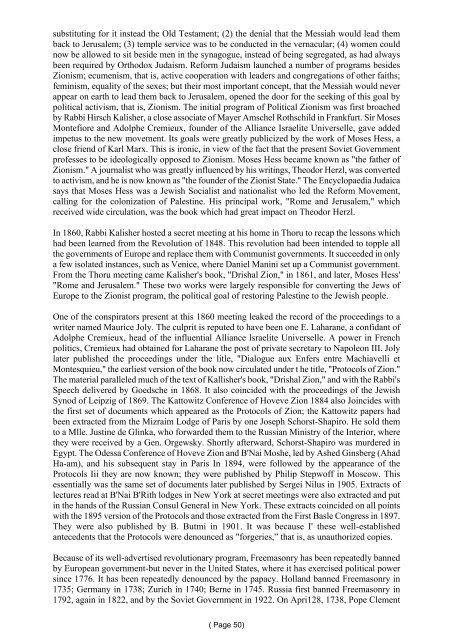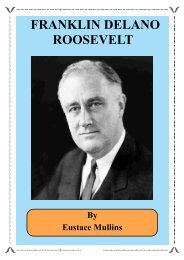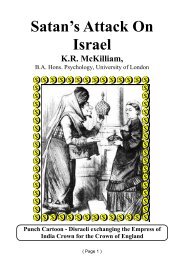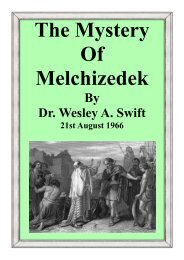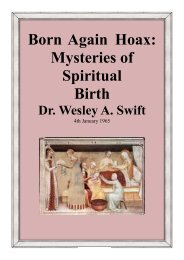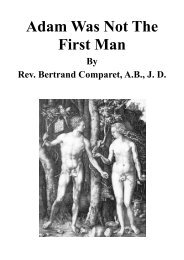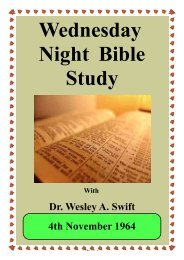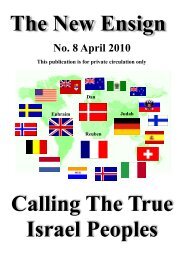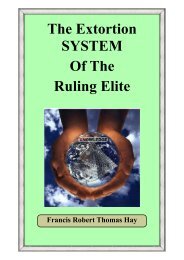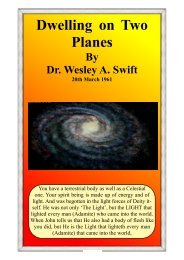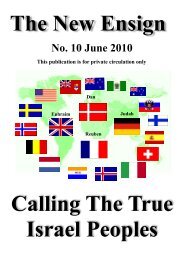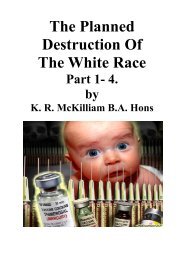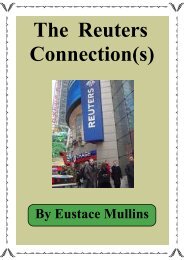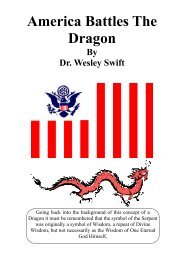Curse of Cannan - The New Ensign
Curse of Cannan - The New Ensign
Curse of Cannan - The New Ensign
You also want an ePaper? Increase the reach of your titles
YUMPU automatically turns print PDFs into web optimized ePapers that Google loves.
substituting for it instead the Old Testament; (2) the denial that the Messiah would lead them<br />
back to Jerusalem; (3) temple service was to be conducted in the vernacular; (4) women could<br />
now be allowed to sit beside men in the synagogue, instead <strong>of</strong> being segregated, as had always<br />
been required by Orthodox Judaism. Reform Judaism launched a number <strong>of</strong> programs besides<br />
Zionism; ecumenism, that is, active cooperation with leaders and congregations <strong>of</strong> other faiths;<br />
feminism, equality <strong>of</strong> the sexes; but their most important concept, that the Messiah would never<br />
appear on earth to lead them back to Jerusalem, opened the door for the seeking <strong>of</strong> this goal by<br />
political activism, that is, Zionism. <strong>The</strong> initial program <strong>of</strong> Political Zionism was first broached<br />
by Rabbi Hirsch Kalisher, a close associate <strong>of</strong> Mayer Amschel Rothschild in Frankfurt. Sir Moses<br />
Montefiore and Adolphe Cremieux, founder <strong>of</strong> the Alliance Israelite Universelle, gave added<br />
impetus to the new movement. Its goals were greatly publicized by the work <strong>of</strong> Moses Hess, a<br />
close friend <strong>of</strong> Karl Marx. This is ironic, in view <strong>of</strong> the fact that the present Soviet Government<br />
pr<strong>of</strong>esses to be ideologically opposed to Zionism. Moses Hess became known as "the father <strong>of</strong><br />
Zionism." A journalist who was greatly influenced by his writings, <strong>The</strong>odor Herzl, was converted<br />
to activism, and he is now known as "the founder <strong>of</strong> the Zionist State." <strong>The</strong> Encyclopaedia Judaica<br />
says that Moses Hess was a Jewish Socialist and nationalist who led the Reform Movement,<br />
calling for the colonization <strong>of</strong> Palestine. His principal work, "Rome and Jerusalem," which<br />
received wide circulation, was the book which had great impact on <strong>The</strong>odor Herzl.<br />
In 1860, Rabbi Kalisher hosted a secret meeting at his home in Thoru to recap the lessons which<br />
had been learned from the Revolution <strong>of</strong> 1848. This revolution had been intended to topple all<br />
the governments <strong>of</strong> Europe and replace them with Communist governments. It succeeded in only<br />
a few isolated instances, such as Venice, where Daniel Manini set up a Communist government.<br />
From the Thoru meeting came Kalisher's book, "Drishal Zion," in 1861, and later, Moses Hess'<br />
"Rome and Jerusalem." <strong>The</strong>se two works were largely responsible for converting the Jews <strong>of</strong><br />
Europe to the Zionist program, the political goal <strong>of</strong> restoring Palestine to the Jewish people.<br />
One <strong>of</strong> the conspirators present at this 1860 meeting leaked the record <strong>of</strong> the proceedings to a<br />
writer named Maurice Joly. <strong>The</strong> culprit is reputed to have been one E. Laharane, a confidant <strong>of</strong><br />
Adolphe Cremieux, head <strong>of</strong> the influential Alliance lsraelite Universelle. A power in French<br />
politics, Cremieux had obtained for Laharane the post <strong>of</strong> private secretary to Napoleon III. Joly<br />
later published the proceedings under the litle, "Dialogue aux Enfers entre Machiavelli et<br />
Montesquieu," the earliest version <strong>of</strong> the book now circulated under t he title, "Protocols <strong>of</strong> Zion."<br />
<strong>The</strong> material paralleled much <strong>of</strong> the text <strong>of</strong> Kallisher's book, "Drishal Zion," and with the Rabbi's<br />
Speech delivered by Goedsche in 1868. It also coincided with the proceedings <strong>of</strong> the Jewish<br />
Synod <strong>of</strong> Leipzig <strong>of</strong> 1869. <strong>The</strong> Kattowitz Conference <strong>of</strong> Hoveve Zion 1884 also Joincides with<br />
the first set <strong>of</strong> documents which appeared as the Protocols <strong>of</strong> Zion; the Kattowitz papers had<br />
been extracted from the Mizraim Lodge <strong>of</strong> Paris by one Joseph Schorst-Shapiro. He sold them<br />
to a Mlle. Justine de Glinka, who forwarded them to the Russian Ministry <strong>of</strong> the Interior, where<br />
they were received by a Gen. Orgewsky. Shortly afterward, Schorst-Shapiro was murdered in<br />
Egypt. <strong>The</strong> Odessa Conference <strong>of</strong> Hoveve Zion and B'Nai Moshe, led by Ashed Ginsberg (Ahad<br />
Ha-am), and his subsequent stay in Paris In 1894, were followed by the appearance <strong>of</strong> the<br />
Protocols Iii they are now known; they were published by Philip Stepw<strong>of</strong>f in Moscow. This<br />
essentially was the same set <strong>of</strong> documents later published by Sergei Nilus in 1905. Extracts <strong>of</strong><br />
lectures read at B'Nai B'Rith lodges in <strong>New</strong> York at secret meetings were also extracted and put<br />
in the hands <strong>of</strong> the Russian Consul General in <strong>New</strong> York. <strong>The</strong>se extracts coincided on all points<br />
with the 1895 version <strong>of</strong> the Protocols and those extracted from the First Basle Congress in 1897.<br />
<strong>The</strong>y were also published by B. Butmi in 1901. It was because I' these well-established<br />
antecedents that the Protocols were denounced as "forgeries,” that is, as unauthorized copies.<br />
Because <strong>of</strong> its well-advertised revolutionary program, Freemasonry has been repeatedly banned<br />
by European government-but never in the United States, where it has exercised political power<br />
since 1776. It has been repeatedly denounced by the papacy. Holland banned Freemasonry in<br />
1735; Germany in 1738; Zurich in 1740; Berne in 1745. Russia first banned Freemasonry in<br />
1792, again in 1822, and by the Soviet Government in 1922. On Apri128, 1738, Pope Clement<br />
( Page 50)


